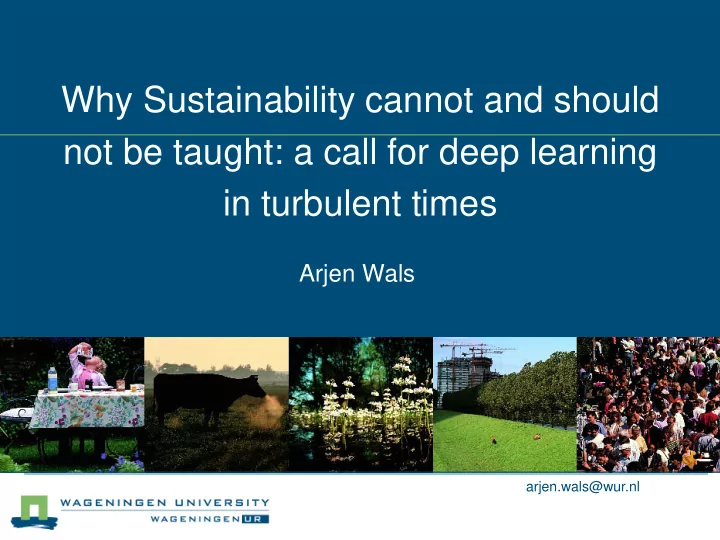

Why Sustainability cannot and should not be taught: a call for deep learning in turbulent times Arjen Wals arjen.wals@wur.nl
Outline From NCE to EE to ESD – a brief history Education and science in ‘postnormal’ times Reorienting education, teaching and learning arjen.wals@wur.nl
arjen.wals@wur.nl
arjen.wals@wur.nl
Katrina arjen.wals@wur.nl
From NCE to ESD - A Very Brief History Nature Conservation Education • ( ≈ 1900 - ≈ 1970) green focus, primary schools, visitor centres Environmental Education & Communication • ( ≈ 1970 - 1992) green and grey focus, primary & secondary, adults, EE centres, environmental campaigns Learning for Sustainable Development • ( ≈ 1992 - present) sustainability focus, teacher training, vocational, higher education, life-long learning, non- formal, community-based learning, CSR) 2005 -2014 UNESCO decade for Education for Sustainable Development arjen.wals@wur.nl
arjen.wals@wur.nl
Source: Wals, A.E.J. (2012) Shaping the Education of arjen.wals@wur.nl Tomorrow: 2012 Full-length Report on the UN Decade of Education for Sustainable Development - DESD Monitoring & Evaluation Report, UNESCO, Paris.
Source: Wals, A.E.J. (2012) Shaping the arjen.wals@wur.nl Education of Tomorrow: 2012 Full-length Report on the UN Decade of Education for Sustainable Development -, UNESCO, Paris.
arjen.wals@wur.nl
arjen.wals@wur.nl
arjen.wals@wur.nl
GREEN Economy? arjen.wals@wur.nl
arjen.wals@wur.nl
arjen.wals@wur.nl
Erosion of trust in science? GMO-foods are inevitable… Runaway (?) climate change… Calcium supplements for women… Should men >50 be tested for prostate cancer? Is organic sustainable and locally grown better? Are vegetables grown in cities healthy? ‘ We are drowning in information …. while starving for wisdom ’ E.O. Wilson, 1998, p. 300) arjen.wals@wur.nl
Post-normalism Complexity Uncertainty and indeterminacy Contestation and controversy – extinction of ‘ truth ’ & erosion of ‘ trust ” (fact free science, fact free politics, science as opinion) Shallowness and hyper-connectivity – erosion of meaning Emergence - reflexivity arjen.wals@wur.nl
Source: Funtowicz, S. O. and Ravetz J. R. (1992) / S. Vohra. 2011 arjen.wals@wur.nl
SO HOW THEN CAN WE TEACH, EDUCATE, LEARN, EMPOWER, … FOR SUSTAINABILITY OR SD? arjen.wals@wur.nl
“ The conventional wisdom holds that all education [and research] is good, and the more of it one has, the better.… The truth is that without significant precautions, [it] can equip people merely to be more effective vandals of the Earth ” (D. Orr). arjen.wals@wur.nl
arjen.wals@wur.nl
Engaging Young People in Sustainability – an example 1. Relevant 2. Real 3. Re-imagining 4. Realistic arjen.wals@wur.nl
arjen.wals@wur.nl
arjen.wals@wur.nl 426.000/day www.chrisjordan.com
What’s it made of? Where does each component come from? How does it affect our lifes? How does it affect the lifes of others? Is there a future for cell phones? arjen.wals@wur.nl
Task Divide in small groups, using your own cell phone and any resources you may have access to, start answering the first two questions: what is in it (or what is it made off)? And, where does everything come from (what part of the world)? Write down all your findings on a sheet of paper which we can display for the larger group! arjen.wals@wur.nl
arjen.wals@wur.nl Mireille Faist Emmenegger, et al, “Life Cycle Assessment of the Mobile Communication System UMTS: Towards Eco-Efficient Systems,” International Journal of Life Cycle Assessment 11, 4, (2006) 265 276
arjen.wals@wur.nl
Megatrend 2: Globalisering arjen.wals@wur.nl
arjen.wals@wur.nl
arjen.wals@wur.nl
arjen.wals@wur.nl
arjen.wals@wur.nl
arjen.wals@wur.nl
arjen.wals@wur.nl
arjen.wals@wur.nl
Lessons learned & competencies developed Local and global issues are connected Information is everywhere, how to choose? Sustainability is multi-dimensional: ecological, economic, ethics, environment, etc. Becoming critical of consumption & consumerism, questioning information – is google always right? Alternatives are possible! Interviewing, presenting, reporting, listening, googeling, critiquing… arjen.wals@wur.nl
arjen.wals@wur.nl
arjen.wals@wur.nl
arjen.wals@wur.nl
Sustainability Competence Understanding sustainable development Dynamics of Systems thinking SD Adopting an integral view Personal leadership and entrepreneurship Unlocking creativity, utilizing diversity Change & Innovation Appreciating chaos & complexity Fostering collective change arjen.wals@wur.nl
arjen.wals@wur.nl Source: George Siemens, 2008
arjen.wals@wur.nl
arjen.wals@wur.nl
Thank you! arjen.wals@wur.nl
Questions – short break arjen.wals@wur.nl
Recommend
More recommend